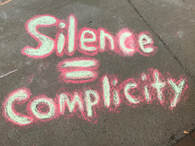|
By: MASCD President, Shaunna Harrington, Ph.D. @shaunna3830  Chalk art from Black Lives Matter protest, Boston, Ma Chalk art from Black Lives Matter protest, Boston, Ma President Trump announced last week at the first-ever White House Conference on American History that he would be signing an executive order to create the 1776 Commission to promote “patriotic education.” The move is part of his broader attack on curriculum that focuses on racism, and the 1619 project in particular, which centers slavery in the history of the United States. Trump has called antiracist curriculum “hateful lies” and “toxic propaganda.” The federal government does not have the authority to establish curriculum, but the president has the power to frighten educators. As a teacher educator, I am particularly concerned about the chilling effect the president’s words could have on new teachers committed to antiracist curriculum. But even more experienced educators are vulnerable to being silenced because of the broadly held belief that schools and teachers should not be political. The adage to “not be political” tends to mean that teachers should not share their beliefs with their students, and should avoid controversial subjects or be careful to present “both sides” of the issue. In order to create antiracist schools, we need to challenge old conventions about what is ‘political.’ We need to stand up and speak out for racial justice. And we need to reject the idea that racism is a ‘controversial’ issue. If we are silent about racism, we cannot provide our students with the school cultures and the learning experiences they need and deserve. We cannot create supportive and validating environments for our students of color, and we cannot engage students of all backgrounds in learning about the ways race and racism shape our lives and our society. If we are silent about racism, we are not doing our jobs as educators. The work of antiracist education cannot be carried by individual teachers. It needs to be foundational to the education profession. That is going to require that we rethink some of the ways we operate as a profession. We cannot be silenced by accusations of being ‘political,’ and we cannot be afraid of naming whose interests are served when certain issues are deemed ‘controversial.’ Racial justice is a moral imperative, and our profession needs to proclaim that without stipulations and without apology.
1 Comment
Leave a Reply. |
Guest AuthorContact us at [email protected] to write for our organization! Categories |
Photo from Mike Kniec

 RSS Feed
RSS Feed